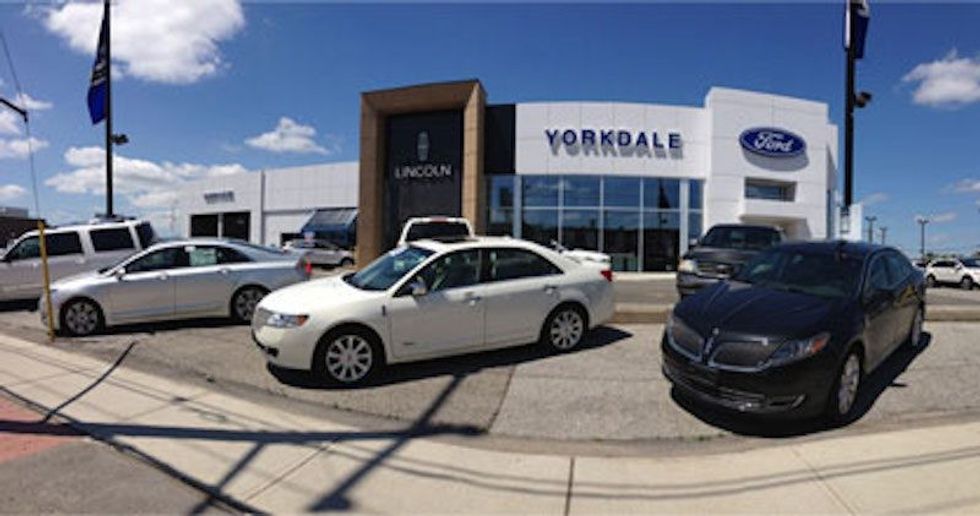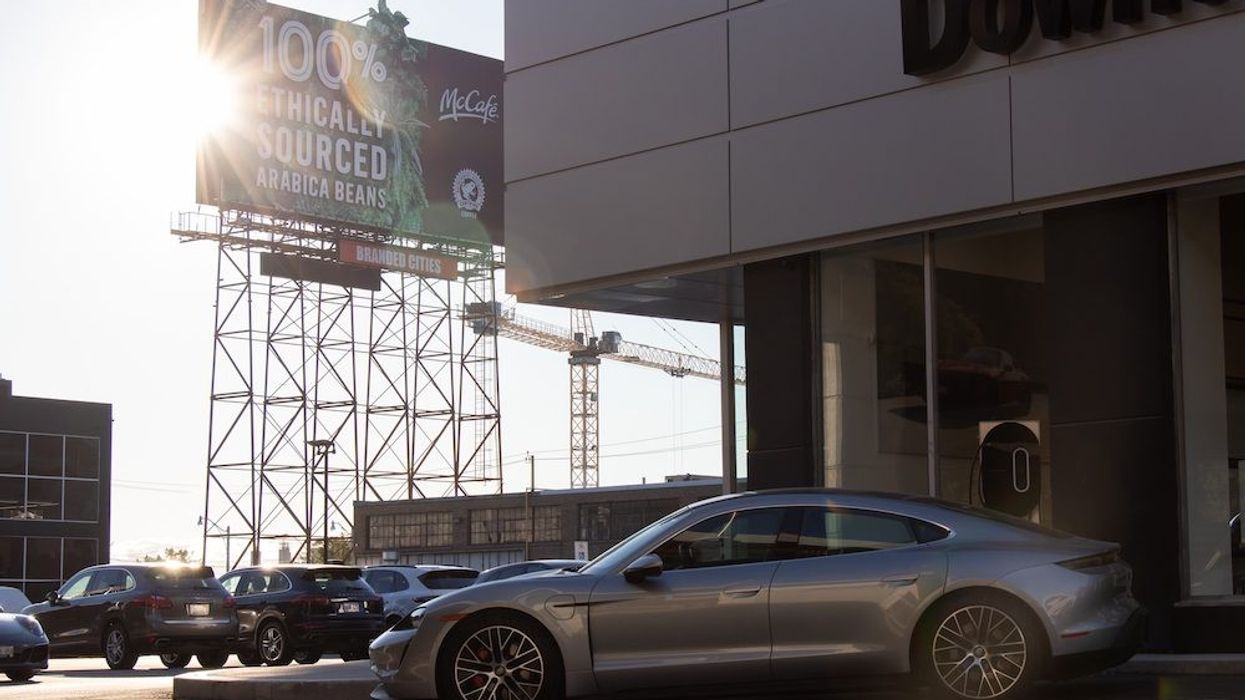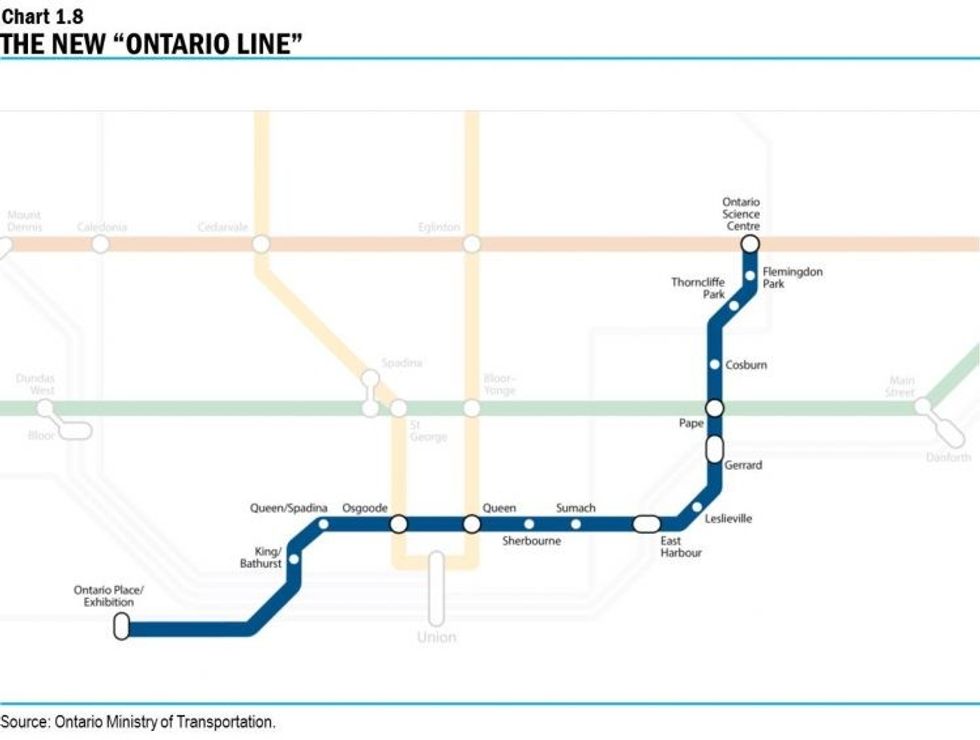Car dealerships, as we know them, are becoming a thing of the past in Toronto.
The reality is that soaring land values, changing consumer behaviour, and supply chain issues in the automotive sector have resulted in an inevitable shift to car sales moving, at least partially, into the virtual space in recent years. Unlike in the past, today’s car dealerships no longer need large plots of land to showcase and sell vehicles, as the auto industry continues to transform with the times.
Take Dufferin Street, for example. The strip south of Yorkdale Shopping Centre to Eglinton Avenue is known for its numerous car dealerships. Following the economies of agglomeration, the idea was that the strip was a destination spot for consumers in the market for a new vehicle. Now, many of these dealerships are set to slowly disappear to make way for shiny new condo developments.
This includes the Yorkdale Dufferin Mazda dealership (2451 Dufferin St.); the Yorkdale Ford dealership (3130 Dufferin St.); the Dean Myers dealership (3180 Dufferin St.); and a Honda dealership (3400 Dufferin St.). There are applications to the City of Toronto, in various stages of approval, outlining big plans to transform the increasingly valuable land these dealerships currently occupy.
Toronto City Councillor Mike Colle (Eglinton-Lawrence) says that the disappearance of the dealerships is a good thing in a modern city, and part of an overall revamp of the historically uninspiring stretch of Dufferin Street -- something he gladly welcomes in his ward.
“This transformation will change Dufferin from a street covered in asphalt and pavement, used car and muffler shops, and drive-in fast food places, to a street where people can live, shop, and walk in the middle of the city,” says Colle. He highlights how the stretch of Dufferin in his ward is close to three subway stations: Eglinton West, Lawrence West, and Yorkdale.
“The street is walkable, with about 10 parks from Eglinton to the 401, great shops, sitting areas, and wide sidewalks coming with the developments,” says Colle. “We’re going to have our own version of the Champs Élysées right here in the heart of Toronto. There will be an anchor point on each end: first, Eglinton and Dufferin all the way to Yorkdale Shopping Centre at the top where you can go to the mall, Costco, Home Depot, and get to the 401. This change will transform Dufferin from a car and truck-centred street to one that prioritizes people; with parks, pedestrians, and homes.”
The emergence of new housing and an influx of new residents will mark a notable improvement in the Dufferin Street neighbourhood, says Colle. “There will be a dramatic upgrade in the quality of life on one of Toronto's main thoroughfares that will provide over 10,000 housing units that range from rentals to condos,” he says. “Dufferin will become a central hub for people to live with easy access to local shops, restaurants, and transit.”
The disappearance of car dealerships is not limited to Dufferin. Over on Leslie Street, there are big plans to replace the Lexus and Toyota dealerships with five new condo towers and thousands of new residents. The planned mixed-use community, by Rowntree Enterprises, notably sits next to the upcoming (at some point) Sunnybrook Park LRT station. Like on Dufferin Street, Leslie Street will become a residential corridor in the coming years.
Not too far away in Leaside, meanwhile, the long-time Mercedes dealership could be demolished and replaced by two condo towers (32 and 21 storeys tall) as well as a park if a pending development application is approved by the City. Like the Leslie Street project, the buildings will sit in close proximity to transit, just steps away from the upcoming Laird LRT station.
We could continue to cite examples, but you get the idea.
“Car dealerships should be a thing of the past in the city core,” says Toronto-based urban planner Naama Blonder. “It’s an underutilized use of city land to have traditional car dealerships, especially because many are in prime locations. I always think of one in the Kensington Market neighbourhood, in particular.”
Blonder is a vocal advocate of a car-free future for Toronto -- especially as the city expands its public transit networks with initiatives like the upcoming Ontario Line -- and predicts we’ll see the gradual extinction of traditional car dealerships in Toronto. “Moving forward, one day we will all use transit and there won’t be a need for a car in the city core in the first place,” says Blonder.
Toronto's shift away from the car, à la Manhattan, is reflected in everything from its massive investments in transportation, to the shrinking number of parking spots allocated in new condo developments and CafeTO.
But the conversion of car dealerships to condos isn’t limited to the Toronto core. For example, the current site of three car dealerships at the Toronto-Vaughan border could see a drastic overhaul in the coming years. Taking the property beyond selling cars, AWIN Group of dealerships has filed plans with both the City of Toronto and the City of Vaughan to construct a four-tower, mixed-use development just west of Yonge Street at 212 Steeles Avenue West. The towers would bring some 1,085 new residential units to the area and add a new public park to the site.
The change won’t happen overnight, however. The site’s redevelopment will be conducted in two phases and spread over 15-20 years in order to maintain operations of the existing dealerships -- a Volkswagen Villa, a Volvo Villa, and the Willowdale Subarau -- for as long as possible, according to the planning documents.
Also outside of the city core, an existing Mazda dealership at Yonge and Steeles could be demolished to make way for the future site of a mixed-use community by Republic Developments that would add some 500 units to North York’s Newtonbrook East neighbourhood.
As the Greater Toronto Area (GTA) increases its density with each ambitious new federal immigration target, and continues to expand its transit systems, this car dealership-to-condo trend is likely to continue. This is especially true if the car dealerships sit on land next to new and upcoming subway stations.
“Under the new provincial policies, you can build any height or density within 500 m of a transit station, so this is going to be happening all over the city," says Colle. "Land prices in the middle of the city are comparable to prices in major cities around the world. You can’t afford to have land sitting there with parked cars; people need to have a place to live, and they certainly want to live in the middle of the city.”

In addition to the destruction of car dealerships all together, Toronto has taken a page from Vancouver’s book with creative mixed-use projects that include both car dealerships and condos. In Vancouver, Destination Auto Group was Canada’s first to construct and operate a full-service car dealership in a building’s podium, with a condo tower above it.
In downtown Toronto’s unofficial car dealership district in the rapidly changing Corktown and Riverdale neighbourhoods, we are seeing the emergence of a shiny new hybrid of car dealerships and condos. In 2021, AWIN Group of Dealorships submitted an application to the City of Toronto to replace an existing Volkswagen dealership showroom at Berkeley and Adelaide streets (550 Adelaide Street East) with a 29-storey mixed-use development with a car dealership at its base.
As opposed to a traditional car dealership, the new one would scale down the on-site services offered, while still accommodating vehicle sales, service pick-ups and drop-offs, and limited repairs. It will function predominately as a showroom, with cars shuttled to other locations for servicing and repairs -- an increasingly common practice in auto sales in other major cities around the world.
Over on the other side of town, the proposed development at 3080 Dufferin Street also involves a mixed-use project of condos and industrial builds, with a glassy new Toyota car dealership at its base. According to plans, an underground garage will provide 370 parking space, with 118 (32%) of those related to the automotive showroom. A six-storey automotive service centre will be built just west of the site.
As for the car dealerships themselves, the way consumers shop for a car is clearly changing. Back in 2016, Genesis Motors, the luxury vehicle division of Hyundai, launched without any traditional brick and mortar dealerships. “An ‘At-Home’ model was developed, whereby Genesis Experience Managers would come to your home or place of business for a test drive, or return the vehicle for complementary scheduled maintenance,” says Dustin Woods, public relations manager at Genesis. “Adding to that, vehicles are offered with transparent, all-inclusive pricing and the entire transaction can actually happen online.”
Genesis has subsequently launched what the brand refers to as an “omni-channel” model, whereby 30 distributors across the country are building Genesis Retail Experience (GRX) facilities. “They are being designed and constructed for the modern acquisition and ownership experience,” says Woods. ”Whether shop-by-shop or standalone facilities, the GRX facilities have been designed for flexibility and profitability, offering a small, manageable foot print that maximizes the space. Our ‘guests,’ as we refer to them, can visit the GRX facility if they prefer, or never leave the comfort of their home.”
Like a growing number of car brands, Genesis also offers the option of virtual reality (VR) in the car-selling process. VR-enabled showrooms offers the customer a more immersive experience than one from an online site, with a 360-degree point of view.
To reduce their footprint, some new dealerships may opt for more of a vertical model, where cars are stored underground. Of course, some auto brands may very well follow Tesla's lead and sell direct to consumer, owning its own stores and removing a traditional "dealership" from the equation all together. Removing the markup from a traditional dealership enables the iconic EV brand to keep costs lower for the consumer, with the costs of all vehicles the same across the country. Tesla stores give consumers information on the vehicles, facilitate a test drive, and assist in the purchase.
Not only does Yorkdale Shopping Centre -- which sits in a location saturated with traditional car dealerships -- house a Tesla store, it also became home to Vietnamese car maker VinFast's first Canadian showroom in November 2022. Like Tesla, the store is minimalist, with just a couple of cars on display.
With the changing shape of the car dealership, the intense densification of the city, and the (eventual) arrival new transit stations, it's safe to say that it won't be long before Toronto's sprawling, car-filled car dealerships become something reserved for photographs of times past.






















